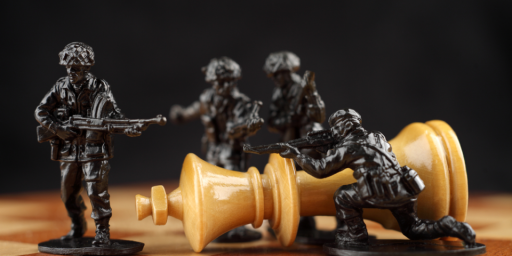The Not-So-Long Gray Line
Lucian Truscott IV, West Point Class of 1969 and noted author, discusses the low retention rate of Academy graduates in an op-ed in today’s New York Times.
June is the month in which West Point celebrates the commissioning of its graduating class and prepares to accept a new group of candidates eager to embrace the arduous strictures of the world’s most prestigious military academy. But it can also be a cruel month, because West Pointers five years removed from graduation have fulfilled their obligations and can resign.
My class, that of 1969, set a record with more than 50 percent resigning within a few years of completing the service commitment. (My father’s class, 1945, the one that “missed” World War II, was considered to be the previous record-holder, with about 25 percent resigning before they reached the 20 years of service entitling them to full retirement benefits.)
And now, from what I’ve heard from friends still in the military and during the two years I spent reporting from Iraq and Afghanistan, it seems we may be on the verge of a similar exodus of officers. The annual resignation rate of Army lieutenants and captains rose to 9 percent last year, the highest since before the Sept. 11 attacks. And in May, The Los Angeles Times reported on “an undercurrent of discontent within the Army’s young officer corps that the Pentagon’s statistics do not yet capture.”
I’m not surprised. In 1975, I received a foundation grant to write reports on why such a large percentage of my class had resigned. This money would have been better spent studying the emerging appeal of Scientology, because a single word answered the question: Vietnam.
[…]
I have met many lieutenants who have served in Bosnia, Afghanistan and Iraq, practically back to back. While everyone in a combat zone is risking his or her life, these junior officers are the ones leading foot patrols and convoys several times a day. Recruiting enough privates for the endless combat rotations is a problem the Army may gamble its way out of with enough money and a struggling economy. But nothing can compensate for losing the combat-hardened junior officers.
In the fall of 2003 I was embedded with the 101st Airborne Division in northern Iraq, and its West Point lieutenants were among the most gung-ho soldiers I have ever encountered, yet most were already talking about getting out of the Army. I talked late into one night with a muscular first lieutenant with a shaved head and a no-nonsense manner who had stacks of Foreign Affairs, The New Yorker and The Atlantic under his bunk. He had served in Bosnia and Afghanistan, and he was disgusted with what he had seen in Iraq by December 2003. “I feel like politicians have created a difficult situation for us,” he told me. “I know I’m going to be coming back here about a year from now. I want to get married. I want to have a life. But I feel like if I get out when my commitment is up, who’s going to be coming here in my place? I feel this obligation to see it through, but everybody over here knows we’re just targets. Sooner or later, your luck’s going to run out.”
[…]
A couple of weeks ago, I got an e-mail message from another West Point lieutenant; he was writing from a laptop in a bunker somewhere in Iraq. “I’m getting out as soon as I can,” he wrote. “Everyone I know plans on getting out, with a few exceptions. What have you got to look forward to? If you come back from a tour of getting the job done in war, it’s to a battalion commander who cares more about the shine on your boots and how your trucks are parked in the motor pool than about the fitness of your unit for war.”
There was a time when the Army did not have a problem retaining young leaders – men like Dwight Eisenhower, George Patton, George Marshall, Omar Bradley and my grandfather, Lucian K. Truscott Jr. Having endured the horrors of World War I trenches, these men did not run headlong out of the Army in the 1920’s and 30’s when nobody wanted to think of the military, much less pay for it. They had made a pact with each other and with their country, and all sides were going to keep it.
The Army goes through these cycles. West Point graduates are perhaps slightly more cynical than their ROTC peers, because they spend four years immersed in an ivory tower being told about an ideal Army that doesn’t exist. Indeed, when I started the ROTC Advanced Program after a year and a half at USMA, I was horrified at how cavalier the instructors were in teaching us to pick our battles with the heirarchy and that doing the honorable thing all the time was a surefire way to kill one’s career. Sadly, they were right.
The clash of the bureaucratic Army and the wartime Army is also something that makes men cynical. When my unit rotated back to Germany after Desert Storm, we immediately started getting an influx of new officers, including a new battalion executive officer. Their spit-and-polish, garrison mentality was sneered at by the young lieutenants who had just come back from war, where these concerns were put into their proper context.
A decade plus of high operations tempo fighting unpopular wars from Somalia to Bosnia to Haiti to Iraq has undeniably taken a huge toll. Having to live that lifestyle, with its brutal impact on family life, has predictably led many who might otherwise have spent 20-30 years in the Service to get out.
Still, I continue to be amazed at the good attitude of those who decide to remain in. Most of the officers I’ve talked to who have been to Iraq, including a couple who were pretty badly wounded, are eager to go back. It’s the bureaucratic Army of endless PowerPoint briefings that they can’t stand, not the wartime Army.






So the army still has the same archtypes from Anton Myrer’s “once an Eagle”.
Courtney Manssengale and Sad Sam Damon live on.
I think there is a lot to be said for the “powerpoint” army vs the war fighting army. It has been a dilemma for the US since we started keeping substantial forces in service during peace time. The person who excels at “keeping their boots shined” is not necessarily the one you want for “charging the hill” (or more accurately flanking the hill to make the enemy’s position untenable and then accepting their surrender or killing them as they pull back from their prepared defenses). On the other hand, when you don’t have an enemy to direct the “firebrand” at, you can have another sort of problem.
I believe the army is addressing this by making it easier to transfer as a sergeant to officer training. The concern I would then have is if we have trouble keeping enough sergeants.
Great post, James. Thanks for the perspective. The young men and women who face several tours in the type of war zones that are Iraq and Afghanistan after the intitial combat “invasion” phase must worry daily whether they will be one of the losers in the casualty lottery. That is thankless and ennervating as those of us who served in Vietnam well know.
That society does not provide much secondary gain for this service means that motivation must come primarily from within. It is a tough problem to solve when the country is unified. Tougher when it is divided. I thought 9/11 would have a longer “shelf life” than it has to help continue motivating the country to support its leadership in fighting a 21st century war.
Perversely, the more successful we are in preventing further attacks on US soil, the less apparent the need to stay on a war footing.
The only historic precedents I can think of are the British experience with their far-flung empire and the shorter cold war.
In one case there was no bogeyman, just the desire to preserve the Empire for Britannia and the Queen. In the latter there was the possiblity of nuclear war to keep us on our toes.
Somehow, Osama and Zarqaui don’t rise to that level.
I don’t think that the reason a lot of folks are getting out is necessarily due to the fact that they do not believe in the cause; I think people just get burned out. West Pointers owe 5 yrs after the academy and many find (everyone single west pointer I served w/ anyway) that the bureacracy of the army, lack of challenges in garrison duty and many of the things that are part of army life (separations from family (divorce rates for the officer core went up 78% over the past three years in one study), pay, control over your life and the things you can’t put your finger on that only those who have served can understand) get old quickly and they want something different.
THey have at least done their time and their part unlike the vast majority of Americans (including a vast majority of our elected and appointed officials).
As far as politics and the cause – sometimes th only way for a soldier to express his view is w/ his feet when he walks out the door at the end of his commitment.
War gets really personal and is’t a political debate when you wear a uniform.
Bravo, well said.
As a reserve Soldier who believes in “the cause,” but left active duty because the demand on me as an individual and on my family was just too much to bear, I couldn’t have said it any better.
Like Mike said, when it involves you, your daily life, your family, and your career, it isn’t about politics. It’s more about the logistics of it all than anything else.
The burden on the Soldier is the burden on the Soldier, regardless of how popular a certain war is.